Tonix Pharmaceuticals Holding Corp. 8-K
Exhibit 99.02

© 2019 Tonix Pharmaceuticals Holding Corp. 1 October 2019 Version P0200 10 - 16 - 19 (Doc 0543) Investor Presentation

© 2019 Tonix Pharmaceuticals Holding Corp. 2 Cautionary Note on Forward - Looking Statements Certain statements in this presentation regarding strategic plans, expectations and objectives for future operations or results are “forward - looking statements” as defined by the Private Securities Litigation Reform Act of 1995 . These statements may be identified by the use of forward - looking words such as “anticipate,” “believe,” “forecast,” “estimate” and “intend,” among others . These forward - looking statements are based on Tonix’s current expectations and actual results could differ materially . There are a number of factors that could cause actual events to differ materially from those indicated by such forward - looking statements . These factors include, but are not limited to, substantial competition ; our need for additional financing ; uncertainties of patent protection and litigation ; uncertainties of government or third party payor reimbursement ; limited research and development efforts and dependence upon third parties ; and risks related to failure to obtain U . S . Food and Drug Administration clearances or approvals and noncompliance with its regulations . As with any pharmaceutical under development, there are significant risks in the development, regulatory approval and commercialization of new products . The forward - looking statements in this presentation are made as of the date of this presentation, even if subsequently made available by Tonix on its website or otherwise . Tonix does not undertake an obligation to update or revise any forward - looking statement, except as required by law . Investors should read the risk factors set forth in the Annual Report on Form 10 - K for the year ended December 31 , 2018 , as filed with the Securities and Exchange Commission (the “SEC”) on March 18 , 2019 , and periodic reports and current reports filed with the SEC on or after the date thereof . All of Tonix's forward - looking statements are expressly qualified by all such risk factors and other cautionary statements .

© 2019 Tonix Pharmaceuticals Holding Corp. 3 Tonix Pharmaceuticals Who we are: • A clinical stage biopharmaceutical company dedicated to developing innovative treatments for patients and making meaningful contributions to society • Focusing on small molecules and biologics to treat psychiatric, pain and addiction conditions, to improve biodefense through potential medical counter - measures and to prevent and treat organ transplant rejection What we do: • Target therapeutic areas with high need for improvement − Conditions with no, or inadequate, treatments − Significant patient populations not well served by existing therapies • Develop innovative treatment options with possibility to be a “game changer” − Scientifically unique and innovative − Strong scientific rationale supported by preliminary clinical evidence and published literature − Proven regulatory pathways and established clinical endpoints − Built on a foundation of proprietary intellectual property

© 2019 Tonix Pharmaceuticals Holding Corp. 4 CNS Candidates in Clinical Development Psychiatry, Pain and Addiction Phase 2 NDA 3 /BLA 4 Market Pipeline Product Indication Phase 3 TNX - 102 SL 1 Bedtime Treatment for PTSD – Tonmya ®2 Daytime Treatment for PTSD TNX - 601 7 TNX - 1300 6 Cocaine intoxication / overdose Cyclobenzaprine HCl sublingual tablets Protectic ® formulation technology Tianeptine oxalate oral formulation Cocaine esterase (recombinant from bacteria) i.v. formulation Phase 1 Bedtime Treatment for Fibromyalgia TNX - 102 SL and TNX - 601 owned outright with no royalties due Bedtime Treatment for Agitation in Alzheimer’s Neurocognitive Dysfunction from Corticosteroids Bedtime Treatment for Alcohol Use Disorder (AUD) 5 1 TNX - 102 SL (cyclobenzaprine HCl sublingual tablets) is an investigational new drug and has not been approved for any indication; 2 Tonmya has been conditionally accepted by the U.S. FDA as the proposed trade name for TNX - 102 SL for the treatment of PTSD. 3 NDA - New Drug Application; 4 BLA – Biologic Licensing Application; 5 Pre - Investigational New Drug (IND) meeting scheduled for October with FDA. Upon receiving FDA clearance of an IND application, TNX - 102 SL for AUD will be Phase 2 ready as it is expected to qual ify for the 505(b)(2) pathway for approval; 6 TNX - 1300 (T172R/G173Q double - mutant cocaine esterase 200 mg, i.v. solution) is an investigational new biologic and has not been approved for any indication; 7 TNX - 601 is in the pre - IND stage in the U.S., but a Phase 1 study for formulation development is currently being conducted outside of the U.S.
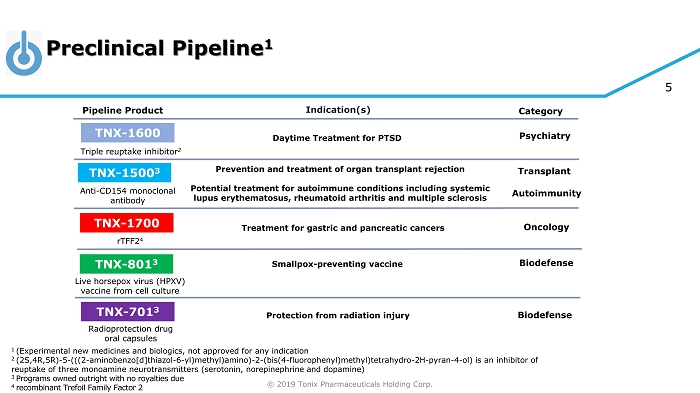
© 2019 Tonix Pharmaceuticals Holding Corp. 5 Preclinical Pipeline 1 1 (Experimental new medicines and biologics, not approved for any indication 2 (2S,4R,5R) - 5 - (((2 - aminobenzo[d]thiazol - 6 - yl)methyl)amino) - 2 - (bis(4 - fluorophenyl)methyl)tetrahydro - 2H - pyran - 4 - ol) is an inhibitor of reuptake of three monoamine neurotransmitters (serotonin, norepinephrine and dopamine) 3 Programs owned outright with no royalties due 4 recombinant Trefoil Family Factor 2 Category Pipeline Product Indication(s) TNX - 801 3 Smallpox - preventing vaccine Live horsepox virus (HPXV) vaccine from cell culture TNX - 701 3 Protection from radiation injury Radioprotection drug oral capsules Triple reuptake inhibitor 2 TNX - 1600 Daytime Treatment for PTSD Psychiatry TNX - 1500 3 Anti - CD154 monoclonal antibody Prevention and treatment of organ transplant rejection Potential treatment for autoimmune conditions including systemic lupus erythematosus, rheumatoid arthritis and multiple sclerosis Autoimmunity Transplant TNX - 1700 rTFF2 4 Treatment for gastric and pancreatic cancers Oncology Biodefense Biodefense
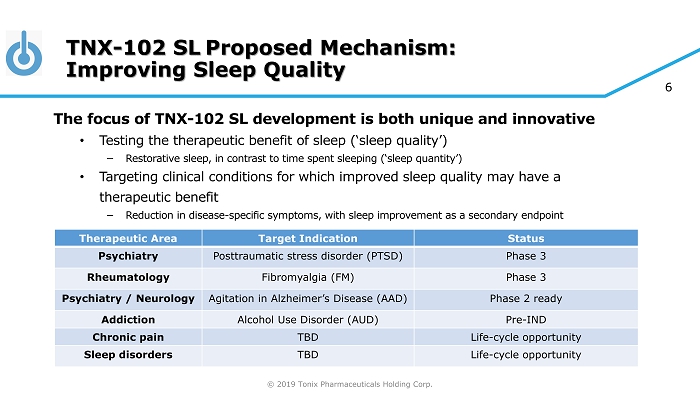
© 2019 Tonix Pharmaceuticals Holding Corp. 6 The focus of TNX - 102 SL development is both unique and innovative • Testing the therapeutic benefit of sleep (‘sleep quality’) − Restorative sleep, in contrast to time spent sleeping (‘sleep quantity’) • Targeting clinical conditions for which improved sleep quality may have a therapeutic benefit − Reduction in disease - specific symptoms, with sleep improvement as a secondary endpoint Therapeutic Area Target Indication Status Psychiatry Posttraumatic stress disorder (PTSD) Phase 3 Rheumatology Fibromyalgia (FM) Phase 3 Psychiatry / Neurology Agitation in Alzheimer’s Disease (AAD) Phase 2 ready Addiction Alcohol Use Disorder (AUD) Pre - IND Chronic pain TBD Life - cycle opportunity Sleep disorders TBD Life - cycle opportunity TNX - 102 SL Proposed Mechanism: Improving Sleep Quality

© 2019 Tonix Pharmaceuticals Holding Corp. 7 TNX - 102 SL Intellectual Property – U.S. Protection expected until 2035 • United States Patent and Trademark Office (USPTO) issued U.S. Patent No. 9636408 in May 2017, U.S. Patent No. 9956188 in May 2018, U.S. Patent No. 10117936 in Nov 2018, and U.S. Patent No. 10,357,465 in July 2019 • China National Intellectual Property Administration issued Chinese Patent No. ZL 201480024011.1 in April 2019 • Indonesian Patent Office issued Indonesian Patent No. IDP000055516 in January 2019 • Saudi Arabian Patent Office issued Saudi Patent No. 6088 in September 2018 • Japanese Patent Office (JPO) issued Japanese Patent No. 6310542 in March 2018 • New Zealand Intellectual Property Office (NZIPO) issued New Zealand Patent No. 631152 in August 2017 • 35 patent applications pending (5 being allowed in U.S, Australia, Europe, Taiwan, South Africa) Composition of matter (eutectic): Protection expected to 2034/2035 • NZIPO issued New Zealand Patent No. 631144 in March 2017 and Patent No. 726488 in January 2019 • Taiwanese Intellectual Property Office issued Taiwanese Patent No. I590820 in July 2017 and Patent No. I642429 in December 2018 • Australian Patent Office issued Australian Patent No. 2013274003 in October 2018 • JPO issued Japanese Patent No. 6259452 in Dec 2017 • 21 patent applications pending Composition of matter (sublingual): Protection expected to 2033 • Hong Kong Patent Office issued Hong Kong Patent No. HK1176235 in September 2018 • USPTO issued U.S. Patent 9918948 in March 2018 • European Patent Office (EPO) issued European Patent No. 2501234B1 in Sept 2017 (validated in 37 countries). In response to an opposition filed in June 2018, EPO’s Opposition Division determined in October 2019 that it will uphold this patent. • 1 patent application pending Method of use (PTSD) for cyclobenzaprine: Protection expected to 2030

© 2019 Tonix Pharmaceuticals Holding Corp. 8 Prevalence of PTSD Among Civilians and Veterans 1 Goldstein et al., 2016 (adjusted for 2019) ; 2 Norris, PTSD Res Quar. 2013; 3 Analysis of VA Health Care Utilization among Operation Enduring Freedom, Operation Iraqi Freedom, and Operation New Dawn Vete ran s, from 1st Qtr FY 2002 through 2nd Qtr FY 2015, Washington, DC ; Among 1.9M separated OEF/OIF/OND veterans, 1.2M have obtained VA healthcare; 685k evaluated by VA with possible mental disorder, and 379k diagnosed with PTSD. >19% Iraq/Afghanistan 3 4.7% Adult population 1 19 - 31% Vietnam veterans 2 12 million American adults annually 1 Women more likely to develop than men 1
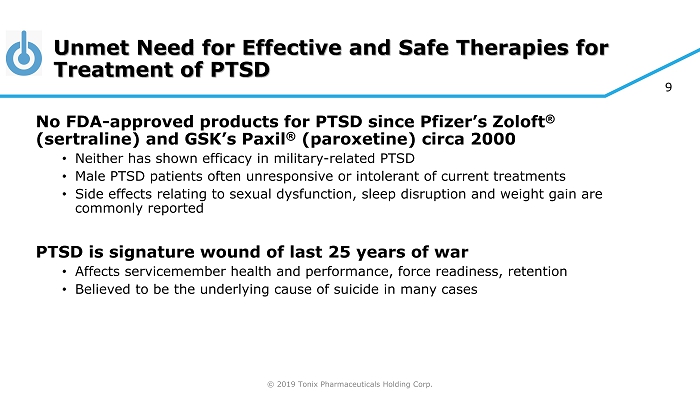
© 2019 Tonix Pharmaceuticals Holding Corp. 9 Unmet Need for Effective and Safe Therapies for Treatment of PTSD No FDA - approved products for PTSD since Pfizer’s Zoloft ® (sertraline) and GSK’s Paxil ® (paroxetine) circa 2000 • Neither has shown efficacy in military - related PTSD • Male PTSD patients often unresponsive or intolerant of current treatments • Side effects relating to sexual dysfunction, sleep disruption and weight gain are commonly reported PTSD is signature wound of last 25 years of war • Affects servicemember health and performance, force readiness, retention • Believed to be the underlying cause of suicide in many cases

© 2019 Tonix Pharmaceuticals Holding Corp. 10 Potential Therapeutic Advantages of TNX - 102 SL TNX - 102 SL is believed to treat PTSD by improving sleep quality • The brain naturally processes memories during sleep • PTSD sufferers’ emotionally charged memories disturb sleep and disrupt the natural processing of memories during sleep • TNX - 102 SL is believed to normalize memory processing and facilitate extinction consolidation (breaking the link between “triggers” and PTSD symptoms) Cyclobenzaprine, active ingredient of TNX - 102 SL, is NEITHER a benzodiazepine nor a narcotic • Does NOT interact with the same receptors as traditional hypnotic sleep drugs associated with retrograde amnesia and is NOT an opiate TNX - 102 SL is non - addictive • Cyclobenzaprine is the active ingredient of an orally ingested immediate release tablet (Flexeril ® ), approved 40 years ago; Flexeril’s current labeling indicates no abuse and dependence concern at higher doses than TNX - 102 SL (15 - 30 mg/day v. 5.6 mg/day) • TNX - 102 SL NDA can be filed without drug abuse and dependency assessment studies Once - daily sublingual dose taken at bedtime enhances patient adherence and transmucosal absorption aligns bioavailability of drug with sleep cycle

© 2019 Tonix Pharmaceuticals Holding Corp. 11 TNX - 102 SL Phase 2 Dose - Effect in Military - Related PTSD 1 1 Completed Phase 2 P201/AtEase study: Retrospective analysis of TNX - 102 SL 5.6 mg on CAPS - 5 ≥33 (high - moderate) subgroup. Primary analysis of P201/ AtEase , based on TNX - 102 SL 2.8 mg in participants with entry CAPS - 5 ≥29 ( moderate PTSD severity), was not statistically significant. 2 CAPS - 5 = Clinician administered PTSD Scale for DSM - 5 7.2 points ** p<0.01, * p<0.025, TNX - 102 SL 5.6 mg group with placebo, MMRM with multiple imputation (MI); * p=0.018, TNX - 102 SL 2.8 mg group with placebo, MMRM with MI PTSD Symptoms (CAPS - 5 2 Score) Remission = Loss of Diagnosis and CAPS - 5 < 11 Asterisk and hashmark represent pairwise comparisons between TNX - 102 SL and Placebo; # p=0.08, Odds Ratio 3.01 (0.89, 10.18) *p=0.02, Odds Ratio 4.60 (1.27, 16.66); logistic regression 5.20% 14.30% 21.10% 0% 5% 10% 15% 20% 25% 30% Weeks 8 & 12 Percent in Remission Placebo (N=77) Tonmya 2.8 mg (N=70) Tonmya 5.6 mg (N=38) # * Remission at Weeks 8 & 12
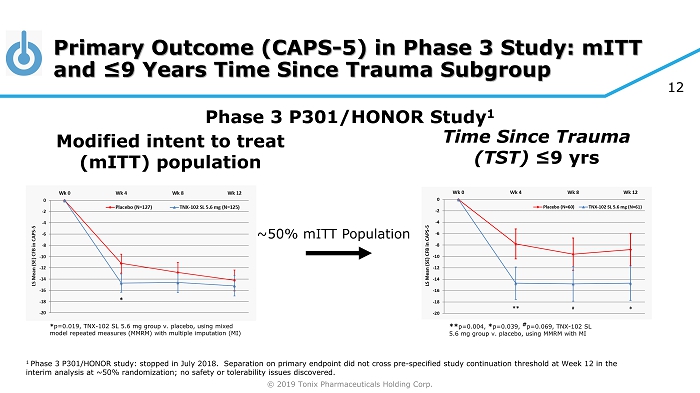
© 2019 Tonix Pharmaceuticals Holding Corp. 12 Primary Outcome (CAPS - 5) in Phase 3 Study: mITT and ≤9 Years Time Since Trauma Subgroup Modified intent to treat ( mITT ) population Phase 3 P301/HONOR Study 1 ** p=0.004, * p=0.039, # p=0.069, TNX - 102 SL 5.6 mg group v. placebo, using MMRM with MI ~50% mITT Population * p=0.019, TNX - 102 SL 5.6 mg group v. placebo, using mixed model repeated measures (MMRM) with multiple imputation (MI) Time Since Trauma (TST) ≤9 yrs 1 Phase 3 P301/HONOR study: stopped in July 2018. Separation on primary endpoint did not cross pre - specified study continuation t hreshold at Week 12 in the interim analysis at ~50% randomization; no safety or tolerability issues discovered.

© 2019 Tonix Pharmaceuticals Holding Corp. 13 Adverse Events (AEs) in P201/AtEase and P301/HONOR Studies No serious or unexpected AEs in P201 or P301 related to TNX - 102 SL • Systemic AEs comparable between studies and also consistent with those described in approved oral cyclobenzaprine product labeling • Severity and incidence of oral hypoesthesia (oral numbness) are not dose related and similar in both studies # only adverse events (AEs) are listed that are at a rate of ≥ 5% in any TNX - treated group *no values in a row for either study means the AE in the active group(s) in that study was at a rate of <5%
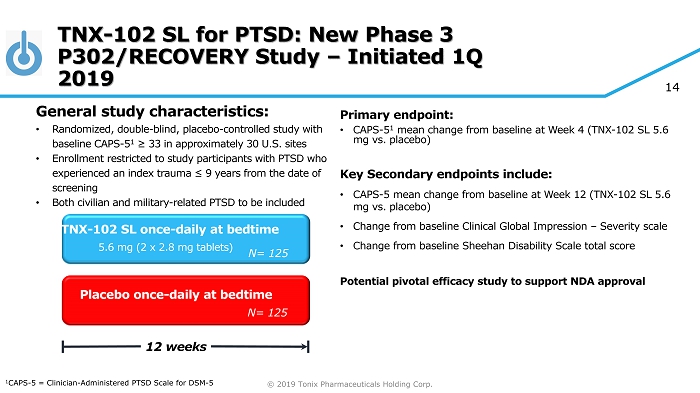
© 2019 Tonix Pharmaceuticals Holding Corp. 14 TNX - 102 SL for PTSD: New Phase 3 P302/RECOVERY Study – Initiated 1Q 2019 Primary e ndpoint: • CAPS - 5 1 mean change from baseline at Week 4 (TNX - 102 SL 5.6 mg vs. placebo) Key Secondary e ndpoint s include: • CAPS - 5 m ean change from baseline at W eek 12 (TNX - 102 SL 5.6 mg vs. placebo ) • Change from baseline Clinical Global Impression – Severity scale • Change from baseline Sheehan Disability Scale total score Potential pivotal efficacy study to support NDA approval Placebo once - daily at bedtime 12 weeks TNX - 102 SL once - daily at bedtime 5.6 mg (2 x 2.8 mg tablets) General s tudy c haracteristics: • Randomized, double - blind, placebo - controlle d study with baseline CAPS - 5 1 ≥ 33 in approximately 30 U.S. sites • Enrollment restricted to study participants with PTSD who experienced an index trauma ≤ 9 years from the date of screening • Both civilian and military - related PTSD to be included 1 CAPS - 5 = Clinician - Administered PTSD Scale for DSM - 5 N= 125 N= 125

© 2019 Tonix Pharmaceuticals Holding Corp. 15 Opportunities to Expand to Other Indications Growing recognition that there are many disorders where sleep disturbances may have a role in the pathophysiology (cardiovascular, metabolic, neurologic) • Homeostatic role of sleep quality in several disorders Psychiatric Disorders • Stress Disorders (PTSD) • Mood Disorders • Anxiety Disorders • Addiction (Alcohol Use Disorder) Chronic Pain States • Chronic wide - spread pain (fibromyalgia) • Osteoarthritis Role of sleep disturbance more established in common psychiatric and neurological/pain disorders • Recognized as a core symptom of many of these disorders • Traditional sleep medications, which increase sleep quantity, may not provide benefit (benzodiazepines in major depression) or are contraindicated (benzodiazepines in PTSD) Psychiatric Symptoms of Neurological Disorders • Agitation in Alzheimer’s • Psychosis in Parkinson’s, Alzheimer’s and other dementias

© 2019 Tonix Pharmaceuticals Holding Corp. 16 Volkswagen Check Engine [Photograph]. (2011, October 14). Wikipedia • Pain is a sensor system in the brain, similar to a check engine light on a car’s dashboard • When the check engine light malfunctions, the light is on even though the car is not malfunctioning • Similarly, in fibromyalgia, the pain alarm is turned on even though there has been no peripheral nerve tissue injury • Fibromyalgia is considered a neurobiological disorder characterized by 1 : chronic widespread pain, non - restorative sleep, fatigue, diminished cognition • Believed to result from inappropriate pain signaling in central nervous system in the absence of peripheral injury 1 • An estimated 5 - 10 million adults in the U.S. have fibromyalgia 2 • Causes significant impairment in all areas of life 3 • Lower levels of health - related quality of life – reduced daily functioning • Interference with work (loss of productivity, disability) • Fewer than half of those treated for fibromyalgia receive sustained benefit from the three FDA - approved drugs 4 • Inflicts substantial strain on the healthcare system • Average patient has 20 physician office visits per year 5 • Annual direct medical costs are twice those of non - fibromyalgia individuals 6 • Substantial off - label use of narcotic painkillers and prescription sleep aids 7 TNX - 102 SL: Potential Treatment for Fibromyalgia 1 Phillips K & Clauw DJ, Best Pract Res Clin Rheumatol 2011;25:141. 2 American College of Rheumatology (www.ACRPatientInfo.org accessed May 7, 2019) 3 Schaefer et al., Pain Pract , 2015. 4 The three drugs with FDA approval for the treatment of fibromyalgia: Pregabalin (Lyrica); Duloxetine (Cymbalta); Milnacipran ( Savella ) 5 Robinson et al, Pain Medicine 2013;14:1400. 6 White et al, J Occupational Environ Med 2008;50:13. 7 Patient Trends: Fibromyalgia”, Decision Resources, 2011.

© 2019 Tonix Pharmaceuticals Holding Corp. 17 TNX - 102 SL: Potential Treatment for Agitation in Alzheimer’s Disease (AAD) Agitation is one of the most distressing and debilitating of the behavioral complications of Alzheimer’s disease • Includes emotional lability, restlessness, irritability and aggression 1 Link between disturbed sleep and agitation in Alzheimer’s 1 - 3 • Agitation is commonly diurnal (“ sundowning ”) Prevalence • Agitation is likely to affect more than half of the 5.3 million Americans who currently suffer from moderate to severe Alzheimer’s disease; expected to nearly triple by 2050 4 Significant unmet need with no FDA approved drugs for the treatment of AAD Proposed Phase 2 IND study can potentially serve as a pivotal efficacy study to support NDA approval 5 1 Rose, K.et al. (2015). American Journal of Alzheimer's Disease & Other Dementias , 30 :78 2 Shih, Y. H., et al. (2017). Journal of the American Medical Directors Association , 18 , 396. 3 Canevelli, M., et al. (2016). Frontiers in medicine , 3 . 4 The Alzheimer’s Association, 2017 Alzheimer’s Disease Facts and Figures: https://www.alz.org/facts/ 5 FDA comments on final protocol received October 2018

© 2019 Tonix Pharmaceuticals Holding Corp. 18 TNX - 102 SL: Potential Treatment for Alcohol Use Disorder (AUD) AUD is a chronic relapsing brain disease • Characterized by compulsive alcohol use, loss of control over alcohol intake, and a negative emotional state when not using Sleep disturbance is extremely common in alcohol recovery 1 • Significantly impacts daytime cognition, mood, and ability to participate in alcohol treatment, and is associated with increased risk of relapse Prevalence • An estimated 16 million people (15.1 million adults) in the U.S. have AUD 2 Three FDA - approved medications • Remains an unmet need due to compliance and safety issues Pre - IND meeting with the FDA in October 2019 • To discuss a potential 505(b)(2) development plan for TNX - 102 SL as a treatment for AUD. • Potentially a Phase - 2 ready IND 1 Arnedt et al, J Addict Dis. 2007 ; 26(4): 41 – 54 2 National Institute on Alcohol Abuse and Alcoholism

© 2019 Tonix Pharmaceuticals Holding Corp. 19 TNX - 1300* for the Treatment of Cocaine Intoxication Recombinant protein that degrades cocaine in the bloodstream 1 • Double - mutant cocaine esterase ( CocE ) • CocE was identified in bacteria ( Rhodococcus ) that use cocaine as its sole source of carbon and nitrogen and that grow in soil surrounding coca plants 2 • CocE catalyzes the breakdown of cocaine into metabolites ecgonine methyl ester and benzoic acid Phase 2 study comp leted by Rickett Benckiser (TNX - 1300 was formerly RBP - 8000) 3 • Volunteer cocaine abusers received cocaine 50 mg i.v. infusion over 10 minutes • TNX - 1300 given one minute after completion of cocaine infusion • Rapidly reversed the physiologic effects of cocaine; cocaine plasma exposures dropped by 90% within two minutes • Well tolerated with the most frequently reported adverse events being gastrointestinal disorders ( including dry mouth, nausea); nervous systems disorders (including headache, dizziness) and skin and subcutaneous tissue disorders (including hyperhidrosis , dermatitis) *TNX - 1300 (T172R/G173Q double - mutant cocaine esterase 200 mg, i.v. solution) is an investigational new biologic and has not been approved for any indication. 1 Gao D et al, Mol Pharmacol . 2009. 75(2):318 - 23. 2 Bresler MM et al, Appl Environ Microbiol . 2000. 66(3):904 - 8. 3 Nasser AF et al, J Addict Dis . 2014;33(4):289 - 302.

© 2019 Tonix Pharmaceuticals Holding Corp. 20 Pharmacotherapies for Cocaine Intoxication Have Not Been Effective 1. Brim et al. Mol Pharmacol . 2011. 2. Melichar et al. Eur J Phamacol . 2003. 3. Narasimhan et al. Future Medicinal Chemistry. 2012. Opiates Simple; mediated by opioid receptors 2 Agonists 2 Naloxone 2 Cocaine MOA of Toxicity Complex; mediated by multiple targets with distinct biological functions 1 Pharmacology Antagonist 1 Pharmacotherapy No FDA - approved medication exists 1 Dopamine transporter Norepinephrine transporter Cardiac sodium channel Cocaine Opiate Opioid receptor Naloxone Treatments for opiates not effective for cocaine:
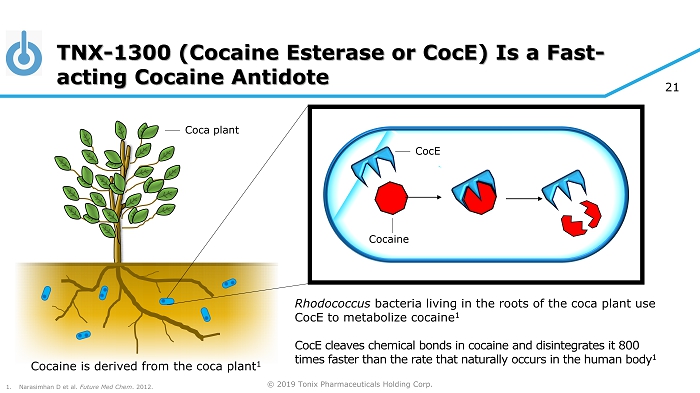
© 2019 Tonix Pharmaceuticals Holding Corp. 21 TNX - 1300 (Cocaine Esterase or CocE ) Is a Fast - acting Cocaine Antidote CocE Rhodococcus bacteria living in the roots of the coca plant use CocE to metabolize cocaine 1 CocE cleaves chemical bonds in cocaine and disintegrates it 800 times faster than the rate that naturally occurs in the human body 1 Cocaine Cocaine is derived from the coca plant 1 1. Narasimhan D et al. Future Med Chem . 2012. Coca plant

Cocaine Intoxication Is a Growing Problem in the U.S. National Drug Overdose Deaths Involving Cocaine 0 5000 10000 15000 Cocaine is involved in more emergency department (ED) visits than any other illicit substance 1 Drug overdose deaths involving cocaine have increased dramatically in recent years 2 1. CBHSQ. DAWN 2011. Rockville, MD: SAMHSA; 2013 2. NIDA. Overdose death rates. https://www/drugabuse.gov/related - topics/trends - statistics/overdose - death - rates. Note: Figures are for illustrative purposes Rate of ED Visits Involving Illicit Drugs per 100,000 People 0 100 200 21% of all emergency department (ED) visits involve cocaine

© 2019 Tonix Pharmaceuticals Holding Corp. 23 TNX - 601 (Tianeptine Oxalate): A Potential Daytime Treatment for PTSD Pre - IND Candidate Targeted as a 1 st line monotherapy for PTSD: oral formulation for daytime dosing x Leverages expertise in PTSD (clinical and regulatory experience, market analysis, etc.) x Mechanism of Action (MOA) is different from TNX - 102 SL • Tianeptine sodium (amorphous), first marketed for depression in France in 1989, is approved as an antidepressant in the EU, Russia, Asia and Latin America; established post - marketing experience • Identified new oxalate salt with improved pharmaceutical properties ideal for reformulation • Preliminary human pharmacokinetic and safety data (non - IND study) from selected formulation expected in second half 2019 Patents and patent applications directed to tianeptine • Issued patent directed to methods of treating cognitive impairment associated with corticosteroid treatment • Patent application directed to oxalate salt Targeting a Condition with Significant Unmet Need Clinical evidence for PTSD • Several studies have shown tianeptine to be active in the treatment of PTSD 1 - 4 1 Frančišković T, et al. Psychiatr Danub . 2011 Sep;23(3):257 - 63. PMID: 21963693 2 Rumyantseva GM and, Stepanov AL. Neurosci Behav Physiol. 2008 Jan;38(1):55 - 61. PMID: 18097761 3 Aleksandrovskiĭ IA, et al. Zh Nevrol Psikhiatr Im S S Korsakova . 2005;105(11):24 - 9. PMID: 16329631 [Russian] 4 Onder E, et al. Eur Psychiatry. 2006 (3):174 - 9. PMID: 15964747

© 2019 Tonix Pharmaceuticals Holding Corp. 24 Management Team Seth Lederman, MD President & CEO Jessica Morris Chief Operating Officer Gregory Sullivan, MD Chief Medical Officer Bradley Saenger, CPA Chief Financial Officer

© 2019 Tonix Pharmaceuticals Holding Corp. 25 Milestones – Recently Completed and Upcoming □ November 201 8 Received FDA minutes confirming agreement on the design of P302/RECOVERY study □ March 2019 P302/RECOVERY study initiated □ April 2019 Received FDA formal minutes with clear guidance and support for new Phase 3 FM study using TNX - 102 SL 5.6 mg □ May 2019 In - licensed TNX - 1300, product candidate in Phase 2 development for cocaine intoxication □ August 2019 In - licensed TNX - 1600, product candidate in preclinical development for PTSD □ August 2019 Entered into research collaboration to study internally - developed TNX - 1500 □ September 2019 In - licensed TNX - 1700, product candidate in preclinical development for gastric and pancreatic cancers □ October 2019 Completed long - term exposure studies in participants with PTSD to evaluate tolerability of TNX - 102 SL 5.6 mg □ October 2019 Meeting with FDA to discuss new program for TNX - 102 SL to treat AUD □ Second Half 2019 P reliminary human pharmacokinetic and safety data (non - IND study) from selected TNX - 601 (tianeptine oxalate) formulation expected □ First Half 2020 Topline data from P302/RECOVERY study expected x x x x x x x x

© 2019 Tonix Pharmaceuticals Holding Corp. 26 Pipeline Summary – by Select Therapeutic Areas • Psychiatry/PTSD: • TNX - 102 SL – (sublingual cyclobenzaprine) for PTSD • Phase 3 • TNX - 601 – (tianeptine) for PTSD • Phase 1 formulation development • TNX - 1600 – (triple reuptake inhibitor) for PTSD • Pre - clinical • Pain: • TNX - 102 SL for fibromyalgia • Phase 3 • Addiction Medicine: • TNX - 1300 – (cocaine esterase) for cocaine intoxication • Mid - Phase 2 • TNX - 102 SL – (sublingual cyclobenzaprine) for alcohol use disorder (AUD) • Pre - clinical; FDA meeting in October to approve IND and Phase 2 • Biodefense: • TNX - 801 – (live horsepox vaccine) – for preventing smallpox • Pre - clinical • TNX - 701 – (oral radioprotective agent) – for radioprotection • Pre - clinical

© 2019 Tonix Pharmaceuticals Holding Corp. 27 Pipeline Summary – by Phase of Development Two Phase 3 Programs in indications affecting millions of Americans • TNX - 102 SL for PTSD: affects 12 million adults in U.S. • TNX - 102 SL for Fibromyalgia: affects between 5 - 10 million adults in U.S. Two Phase 2 Programs in indications for which there is no FDA - approved drug available • TNX - 1300 for Cocaine Intoxication • TNX - 102 SL for Agitation in Alzheimer’s Disease Robust pipeline of preclinical and Phase 1 products to improve biodefense, leverage PTSD and internal expertise

© 2019 Tonix Pharmaceuticals Holding Corp. 28 Thank you ! NASDAQ: TNXP